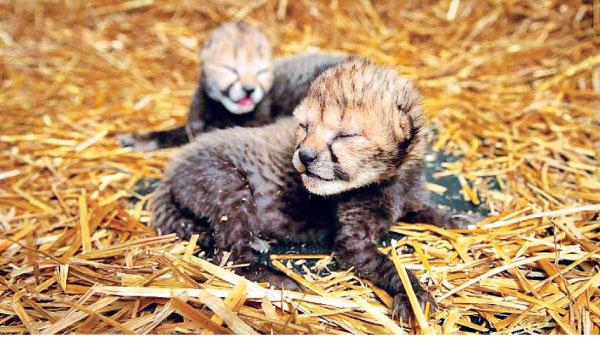
A pair of cheetah cubs has been born from vitro fertilisation to a surrogate cheetah mother for the first time, and experts are hailing it a “huge scientific breakthrough.”
The cubs were born on February 19 at the Columbus Zoo in Ohio to their surrogate mother Izzy, a three-year-old cheetah, according to Smithsonian's National Zoo. Their biological mother is 6 1/2-year-old Kibibi.
Scientists at the Smithsonian Conservation Biology Institute and the Columbus Zoo had collected semen from a male cheetah living at Fossil Rim Wildlife Centre in Texas and froze it, the National Zoo said.
They then harvested eggs from Kibibi in November and fertilised them with the sperm. The fertilised embryos were transferred to Izzy and after a three-month pregnancy, the two adorable cubs were born.
While scientists have been studying IVF and embryo transfer in cheetahs for 15 years, this is just the third time it was attempted and the first time cubs were successfully born, the National Zoo said.
That's significant because over the past 50 years, cheetahs have become extinct in at least 13 countries, according to the National Zoo. Today there are only about 7,500 cheetahs remaining in the wild because of habitat destruction, hunting and other conflicts with humans, according to the zoo.
The illegal pet trade is another factor in cheetah population loss.
Cheetahs are currently listed as a vulnerable species by the International Union for Conservation of Nature, but researchers in a 2016 study said that cheetahs should be recategorised as endangered.
But the birth of the two cubs has scientists hoping IVF can ensure more cheetahs breed and contribute to the genetic diversity of the population.
“This is a huge scientific breakthrough and, in many ways, is much better because it gives us much more flexibility with limited genetic material. This is an amazing milestone for cheetahs -- we can extend a cheetah's biological clock,” said Adrienne Crosier, a cheetah biologist at the Smithsonian Conservation Biology Institute.
The implications of the success of IVF in cheetahs goes much further than just restoring the cheetah population, according to Pierre Comizzoli, a reproductive biologist at the institute.
(Internet)
